Doggy style
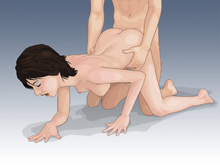
Doggy style, also spelled doggie style, is a sex position in which a person bends over, crouches on all fours (usually on hands and knees), or lies on their abdomen, for sexual intercourse, other forms of sexual penetration or other sexual activity. Doggy style is a form of a rear-entry position, others being with the receiving partner lying on the side in the spoons sex position[1] or the reverse cowgirl sex position. Non-penetrative sex in this position may also be regarded as doggy style. Between sex partners, the person in the doggy style position is passive,[2] while the other partner is active. Either partner may be the dominant partner or the submissive partner.[2] The passive partner is open to a variety of additional sexual activities, with the active partner being able to penetrate the vagina, the anus during anal sex, or being in a position to perform oral sex (cunnilingus, fellatio or anilingus).
History and etymology
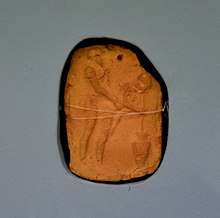
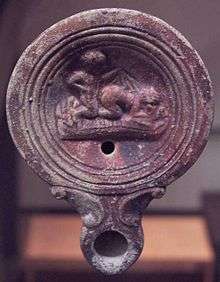
In ancient Rome, this practice was known as coitus more ferarum, Latin for "sexual intercourse in the manner of wild beasts".[3] The specific origin of the term doggy style is not known, but is presumably a reference to the initial position assumed by dogs when mating. It is described in the Kama Sutra as the cow position or the congress of a cow,[4] and is listed in The Perfumed Garden.[5]
Practices
The posture adopted by the receiving partner resembles lordosis behavior – a physical posture seen in many female mammals, often when they are ready for sex/mating, the primary characteristic of which is a ventral arching of the spine. During vaginal penetration from behind, the penis may penetrate deeper into the vagina, reaching preferential contact with the posterior wall of the vagina and probably reaching the posterior fornix; while in the missionary position, it is in preferential contact with the anterior wall of the vagina and the tip of the penis can reach the anterior fornix.[6]
The active partner may also massage or stimulate the receiving partner's erogenous zones, such as the genitals, nipples, buttocks, or administer a playful spank to the buttocks,[1][7] or introduce a sex toy, such as a dildo or vibrator, into the vagina or anus. The doggy position may be erotic or sexually provocative for participants.[8]
Confirming its popularity, in 2015 a poll of 2,157 British men and women found that regionally, doggy style was favored by the Welsh.[9]
Advantages and disadvantages
Doggy style is a less physically demanding sex position and may be a preferred sex position if either partner has back issues or some other medical conditions. During doggy style, the scrotum sometimes provides friction to the clitoris, thus possibly producing an orgasm or sexual stimulation in the woman.[10][11]
Doggy style has advantages and disadvantages. In a doggy style position, a woman may feel vulnerable, which some women find arousing in itself; while others consider doggy style unromantic.[1] For some women, doggy style offers stimulation of an area that may be termed "the G-spot". However, this position may offer only minimal stimulation of the clitoris, so some women may require manual stimulation to achieve orgasm. Some men may, however, be able to stimulate the clitoris simultaneously with the penis and the scrotum respectively during doggy style.[11]
The position is considered by some to be less intimate because eye contact and kissing are more difficult. According to the book Sexual Pleasure by Barbara Keesling, many established couples find doggy style relationship-affirming, as it requires and implies a level of trust and a surrender of control by the receiving to the active partner.[12]
As a theme in art
Doggy style has been known in most cultures in all times, and has been depicted in art:
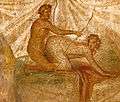
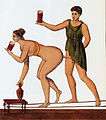 Pompeii - Osteria della Via di Mercurio
Pompeii - Osteria della Via di Mercurio
 Utamaro, 1799
Utamaro, 1799
 Édouard-Henri Avril - Hadrian and Antinous in a doggy style position
Édouard-Henri Avril - Hadrian and Antinous in a doggy style position Achille Devéria (1800-1857) a couple having doggy style sex
Achille Devéria (1800-1857) a couple having doggy style sex
See also
References
- 1 2 3 Nilamadhab Kar; Gopal Chandra Kar (2005). Comprehensive Textbook of Sexual Medicine. Jaypee Brothers Publishers. pp. 110–111. ISBN 8180614050. Archived from the original on June 27, 2014. Retrieved February 10, 2014.
- 1 2 Comfort, Alex; Quilliam, Susan (2008). The Joy of Sex. London: Mitchell Beazley. ISBN 1-84533-429-9.
- ↑ Robert J. Campbell (2009). Campbell's Psychiatric Dictionary. Oxford University Press. p. 204. ISBN 978-0-19-534159-1.
- ↑ The Kama Sutra, as given at "CHAPTER VI". The Kama Sutra of Vatsayayana. Kamasutra-sex.org. 1883.
- ↑ The Perfumed Garden. Park Street Press. pp. 38–41. ISBN 0892814438.
- ↑ A. Faix; J. F. Lapray; O. Callede; A. Maubon; K. Lanfrey (2002). "Magnetic Resonance Imaging (MRI) of Sexual Intercourse: Second Experience in Missionary Position and Initial Experience in Posterior Position" (PDF). Journal of Sex & Marital Therapy. 28: 63–76. doi:10.1080/00926230252851203. Archived from the original (PDF) on 2012-09-05. Retrieved 2012-07-31.
- ↑ Rogiere, Jean, The Little Book of Sex. Ulysses Press, 2001. ISBN 1-56975-305-9, 96 pages.
- ↑ Laura T. Coffey (Sep 23, 2009). "Do high heels empower or oppress women?". TODAY msnbc.com.
- ↑ "The UK's 'favourite sex positions' revealed in new survey". independent.co.uk. The Independent.
- ↑ Janssen, Erick, Nicole Prause, and James H. Geer. "The sexual response." Handbook of psychophysiology (2007): 245-266
- 1 2 Jones, Richard (2013). Human Reproductive Biology. Academic Press. p. 74.
The rear-entry position of mating may allow the scrotum to stimulate the clitoris and, in this way, may produce an orgasm ...
- ↑ Keesling, Barbara (1993). Sexual Pleasure: Reaching New Heights of Sexual Arousal & Intimacy. Hunter House Publishers. p. 167. ISBN 978-0-89793-148-9.
External links
| Wikimedia Commons has media related to Doggy style positions. |